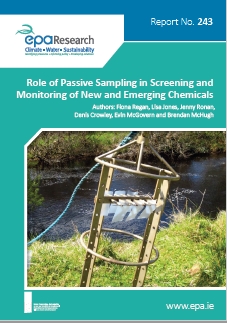
Authors: Fiona Regan, Lisa Jones, Jenny Ronan, Denis Crowley, Evin McGovern and Brendan McHugh, April 2018
Year: 2018
Passive sampling (PS) techniques are rapidly developing as very cost-effective state-of-the-art tools for identifying and measuring ultra-trace micropollutants in water.
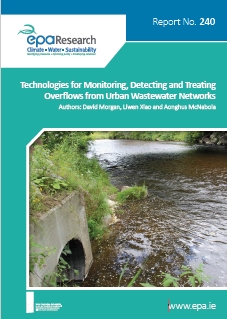
Authors: David Morgan, Liwen Xiao and Aonghus McNabola, March 2018
Year: 2018
In Ireland, most urban areas are drained by combined sewer systems, which convey wastewater and stormwater in a single pipe. During rainfall the capacity of combined sewers may be exceeded, leading to untreated discharges to receiving waters via storm water overflows (SWOs), which are a source of microbial pathogens.
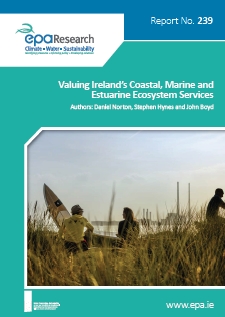
Authors: Daniel Norton, Stephen Hynes and John Boyd, January 2018
Year: 2018
This technical report demonstrates the data sources and methods that can be used to estimate the value of a number of coastal and marine ecosystem service benefits.
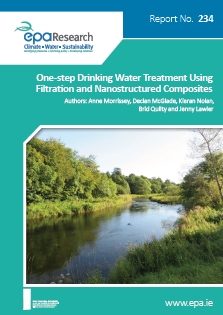
Authors: Anne Morrissey, Declan McGlade, Kieran Nolan, Brid Quilty and Jenny Lawler, December 2017
Year: 2017
This report provides a summary of the findings of the research on the design, development and testing of a novel drinking water treatment system using a combination of filtration and nanostructured composites for the removal of inorganic, organic and microbiological contaminants from water.
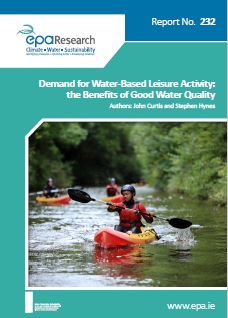
Authors: John Curtis and Stephen Hynes, November 2017
Year: 2017
The objective of this research was to determine how water-based recreational activities in Ireland are affected by differences in water quality across recreational sites.
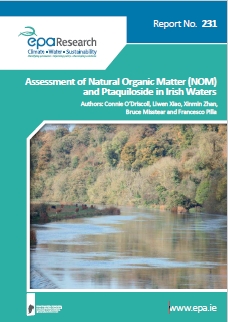
Authors: Connie O’Driscoll, Liwen Xiao, Xinmin Zhan, Bruce Misstear and Francesco Pilla, November 2017
Year: 2017
Ireland has an unacceptably high number of drinking water supplies that exceed the parametric value of 100 μg L-1 for total trihalomethanes (THMs) and has been reporting the highest non-compliance with respect to total THMs in drinking water across the 27 EU Member States.
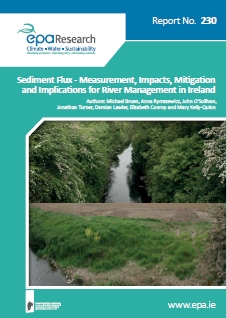
Authors: Michael Bruen, Anna Rymszewicz, John O’Sullivan, Jonathan Turner, Damian Lawler, Elizabeth Conroy and Mary Kelly-Quinn, November 2017
Year: 2017
The SILTFLUX project addressed three major objectives related to sediment pollution in rivers.
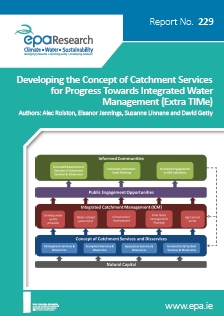
Authors: Alec Rolston, Eleanor Jennings, Suzanne Linnane and David Getty, November 2017
Year: 2017
The benefits and disservices received by people and ecosystems within catchments are called catchment services and disservices. Their delivery can be influenced by multiple factors including climate, legislative/policy and social (demographic) change.
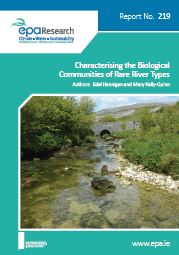
Authors: Edel Hannigan and Mary Kelly-Quinn, July 2017
Year: 2017
Research Report 219 Characterising the Biological Communities of Rare River Types
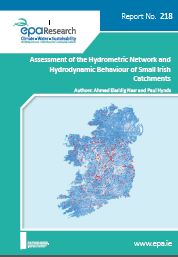
Authors: Ahmed Elssidig Nasr and Paul Hynds, June 2017
Year: 2017
Research Report 218 on the Assessment of the Hydrometric Network and Hydrodynamic Behaviour of Small Irish Catchments
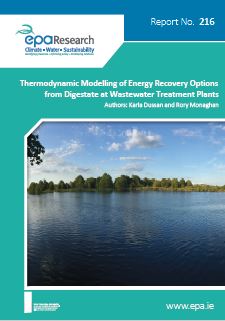
Authors: Karla Dussan and Rory Monaghan, June 2017
Year: 2017
EPA Research 216 detailing Thermodynamic Modelling of Energy Recovery Options from Digestate at Wastewater Treatment Plants
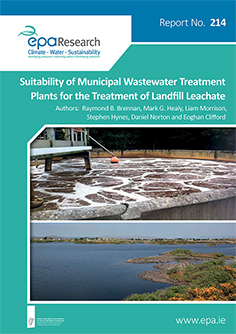
Authors: Raymond B. Brennan, Mark G. Healy, Liam Morrison, Stephen Hynes, Daniel Norton and Eoghan Clifford, June 2017
Year: 2017
Research 214 on the Suitability of Municipal Wastewater Treatment Plants for the Treatment of Landfill Leachate
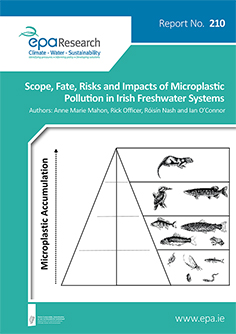
Authors: Anne Marie Mahon, Rick Officer, Róisín Nash and Ian O’Connor, April 2017
Year: 2017
Research report 210 on the Scope, Fate, Risks and Impacts of Microplastic Pollution in Irish Freshwater Systems
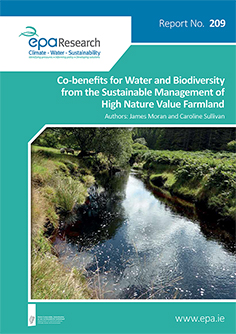
Authors: James Moran and Caroline Sullivan, April 2017
Year: 2017
Agriculture systems in Europe range from very intensive production on fertile land with high inputs to very extensive High Nature Value (HNV) farmland on marginal land with low inputs.
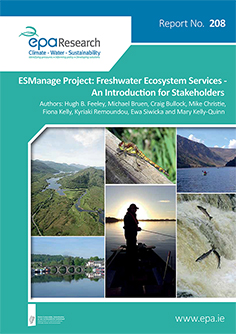
Authors: Hugh B. Feeley, Michael Bruen, Craig Bullock, Mike Christie,Fiona Kelly, Kyriaki Remoundou, Ewa Siwicka and Mary Kelly-Quinn, March 2017
Year: 2017
The objective of this project is to harness the knowledge and tools required to embed an appreciation of ecosystem services and the ecosystems services approach into policy and decision-making for sustainable management of water resources, as required by the Water Framework Directive
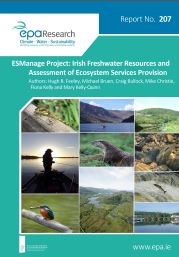
Authors: Hugh B. Feeley, Michael Bruen, Craig Bullock, Mike Christie, Fiona Kelly and Mary Kelly-Quinn, March 2017
Year: 2017
The objective of this project is to harness the knowledge and tools required to embed an appreciation of ecosystem services and the ecosystems services approach into policy and decision-making for sustainable management of water resources, as required by the Water Framework Directive
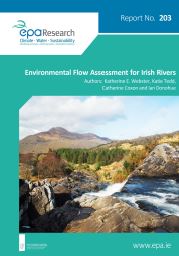
Authors: Katherine E. Webster, Katie Tedd, Catherine Coxon and Ian Donohue, March 2017
Year: 2017
The overarching goal of this project was to review state of the art EFlow methodology to identify alternatives most suited to the Irish context and for developing flow standards.
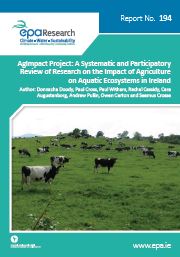
Authors: Donnacha Doody, Paul Cross, Paul Withers, Rachel Cassidy, Cara Augustenborg, Andrew Pullin, Owen Carton and Seamus Crosse, December 2016
Year: 2016
Research 194: AgImpact Project: A Systematic and Participatory Review of Research on the Impact of Agriculture on Aquatic Ecosystems in Ireland
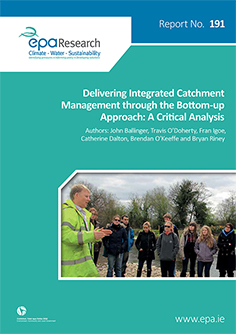
Authors: John Ballinger, Travis O’Doherty, Fran Igoe, Catherine Dalton, Brendan O’Keeffe and Bryan Riney, December 2016
Year: 2016
Research report 191 - A Critical Analysis of Delivering Integrated Catchment Management through the Bottom-up Approach
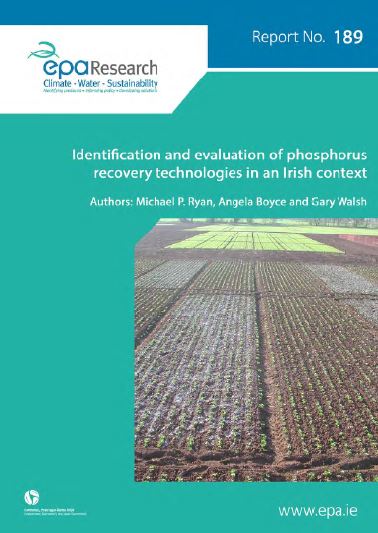
Authors: Michael P. Ryan, Angela Boyce and Gary Walsh, December 2016
Year: 2016
Research report 189 on Identification and evaluation of phosphorus recovery technologies